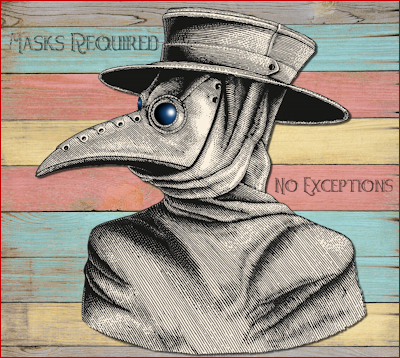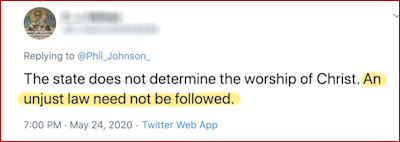
 his guy, angry that Grace Community Church yielded to the 9th Circuit Court's ruling banning church meetings in California this weekend, Tweets at me: "An unjust law need not be followed."
his guy, angry that Grace Community Church yielded to the 9th Circuit Court's ruling banning church meetings in California this weekend, Tweets at me: "An unjust law need not be followed."
I'm appalled at how many people who profess to believe Scripture echo that sentiment. Nero was emperor when Paul wrote Romans 13:1-7: "Let every person be subject to the governing authorities. For there is no authority except from God, and those that exist have been instituted by God. . . ." First Peter 2:13 was written to people suffering unjustly. ("Be subject for the Lord's sake to every human institution, whether it be to the emperor as supreme, or to governors as sent by him...")
Peter goes on to say: "Be subject . . . also to the unjust. For this is a gracious thing, when, mindful of God, one endures sorrows while suffering unjustly" (vv. 18-19). Indeed, "to this [unjust suffering] you have been called, because Christ also suffered for you, leaving you an example, so that you might follow in his steps." (v. 21). When someone in authority over us treats us unjustly, the example we are to follow was set for us by Christ, who simply "continued entrusting himself to him who judges justly" (v. 23).
The only exception to this principle is when the one in authority instructs us to sin. Then "we must obey God rather than men" (Acts 5:29).
So does a government-mandated quarantine ask us to violate Hebrews 10:25 ("not neglecting to meet together"), or is the quarantine in keeping with the principle of Leviticus 13-14, where quarantines are expressly mandated?
The answer to that question may vary according to where we live. Quarantining people in the midst of a pandemic is a legitimate prerogative of government. How long the quarantine should last and who should be exempted are questions that don't have clear, fixed answers. The severity and duration of the pandemic determines what's reasonable or not. We may or may not agree with how the quarantine is being implemented (I certainly do not), but we have a clear duty to submit unless we are being asked to sin.
How long until the government-ordered quarantine is undeniably excessive, or we conclude that it's targeted persecution against our worship and therefore an illegal attempt to make us disobey Hebrews 10:25? That time may come, and when it does, we may have to implement the principle of Acts 5:29. The question of whether we have already passed that point is another subjective issue, but it's clear that among believers—in the church itself—there is not yet consensus on whether the quarantine has gone too far.
Nevertheless, if you hang out on Twitter or Facebook, you may have noticed that there are countless people in the evangelical community who refuse to regard any of the above questions as matters of conscience. They believe the answers are perfectly obvious. They are eager to tell you what you and your church ought to be doing. They are locked and loaded with vituperation for anyone who sees matters differently. Two camps of them have squared off against each other—hordes of angry Karens at opposite extremes, all of whom disagree with the position I've outlined above. Some of them are scolding us for thinking Romans 13 and 1 Peter 2 actually apply in today's circumstances. The others are berating us for wanting to resume public worship ASAP.
Sorry, but in the words of Martin Luther, here I stand. I can do no other. I cannot and will not recant anything, for to go against conscience is neither right nor safe. God help us.











